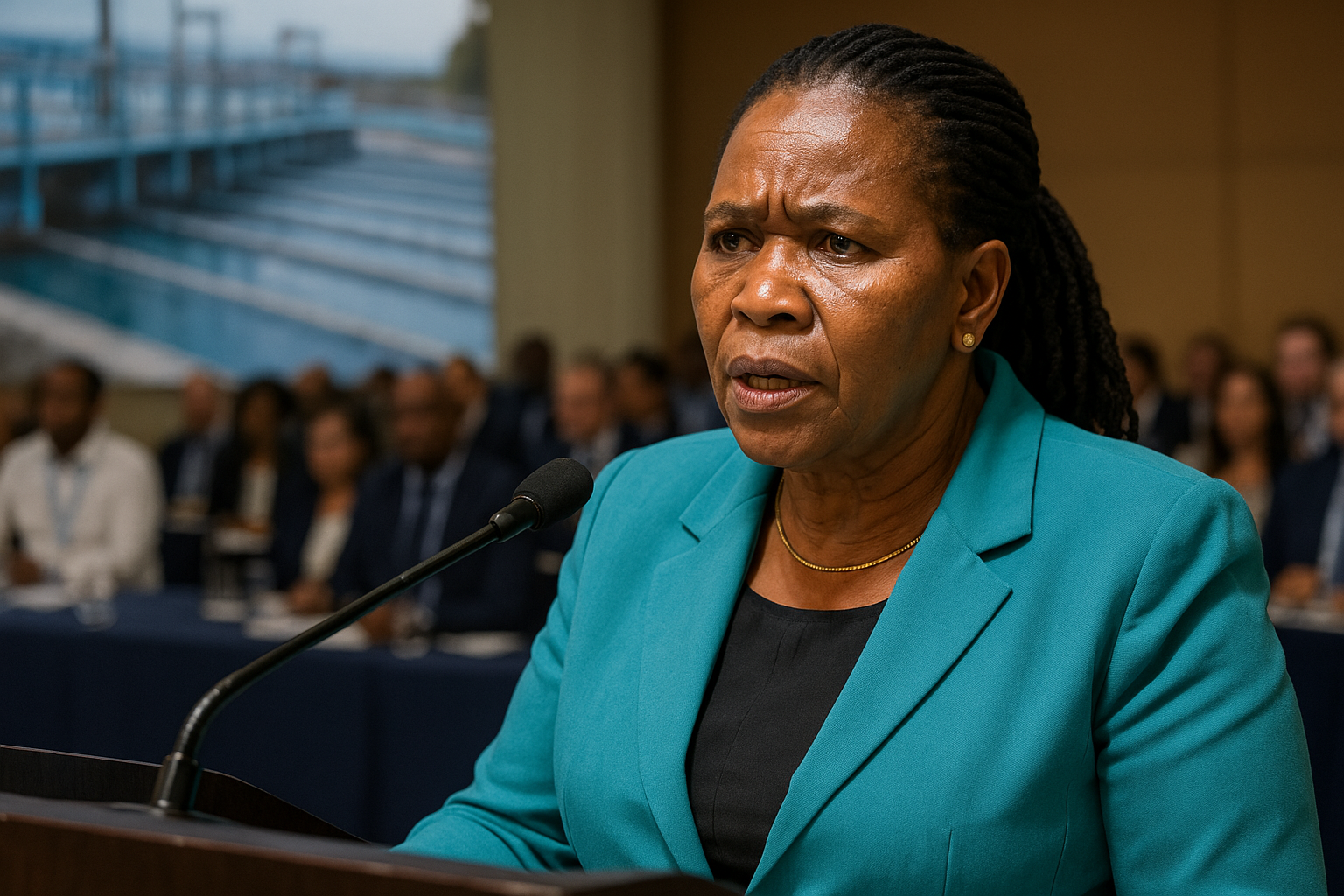Pemmy Majodina Urges Water-Friendly Budgets as National Water Crisis Deepens
The Minister revealed that municipalities collectively owe a staggering R24 billion to the country’s water boards—state-owned entities responsible for ensuring bulk water supply.

- Country:
- South Africa
Water and Sanitation Minister Pemmy Majodina has issued a clarion call to all Premiers, Executive Mayors, and Municipal Executives to urgently pass "water-friendly" budgets and prioritize water and sanitation infrastructure in their fiscal plans. Her remarks opened the Water and Sanitation Indaba on Thursday, a two-day gathering of top government officials and stakeholders aimed at addressing the mounting crisis in South Africa’s water sector.
Majodina stressed that South Africa is facing a deepening challenge in water reliability and wastewater management, with many Water Services Authorities (WSAs), including key metropolitan municipalities, failing to fulfill their constitutional obligations. The Minister highlighted that the latest assessments show significant decline in how municipalities manage water services, with alarming performance metrics across the top 100 municipalities nationwide.
“The water and sanitation systems of our country are under immense pressure. Despite clean bulk water being available, millions of citizens still lack proper water access due to failures in municipal reticulation and management,” said Majodina.
She attributed the worsening state of water delivery not to the absence of water, but to systemic governance failures, underinvestment, mismanagement, and widespread non-revenue water—water that is lost due to leaks, theft, or faulty metering.
Municipal Debt and Accountability Measures
The Minister revealed that municipalities collectively owe a staggering R24 billion to the country’s water boards—state-owned entities responsible for ensuring bulk water supply. This mounting debt has now reached a crisis point, threatening the viability of water boards and the sustainability of water delivery.
“There is no shortage of bulk water. The problem lies in its distribution—pipes are leaking, infrastructure is crumbling, and clean, treated water ends up flowing down the streets instead of into homes,” she added.
To address this, Majodina confirmed that the Department of Water and Sanitation (DWS) will launch a national roadshow to meet with all Premiers, MECs, Executive Mayors, and municipal teams. These engagements will be used to table reports and outline direct interventions for struggling municipalities.
Enforcing Compliance and Anti-Corruption Drive
In a bold move, Majodina announced that WSAs failing to comply with grant conditions will no longer receive direct funding from the department. Instead, the DWS will take full control of the planning and implementation of water infrastructure projects using the Water Services Infrastructure Grant (WSIG).
“This is about accountability. Where money has been misused or underutilized, we will intervene. The WSIG allows us to fast-track critical projects, especially in rural and underserved communities,” said Majodina.
She also emphasized the department's collaboration with the Special Investigating Unit (SIU), which has already recovered R459 million linked to fraud and corruption in the water sector. Plans are in place to launch a dedicated Anti-Corruption Forum to clean up the water and sanitation space.
Call to Action: Water as a Constitutional Right
Also speaking at the Indaba, Minister of Cooperative Governance and Traditional Affairs (CoGTA), Velenkosini Hlabisa, underlined that access to clean water and sanitation is not a luxury, but a constitutional right.
“Water is the heartbeat of life—it is fundamental to health, human dignity, and economic development. We cannot view access to clean water as negotiable,” Hlabisa said. He reiterated the need for all levels of government to work collaboratively and urgently to turn the tide.
Provincial Response and Crisis Management
Gauteng Premier Panyaza Lesufi echoed the Minister’s concerns, pointing out that poor water management—not water scarcity—is at the core of the crisis. He thanked the Department of Water and Sanitation for decisive interventions that recently resolved long-standing blockages in two key water pumping stations in the province.
“These were critical delays, and thanks to the Ministry’s leadership, we managed to restore water supply to numerous affected communities. We must maintain this momentum,” said Lesufi.
Presidential Support and Operation Vulindela
President Cyril Ramaphosa also addressed the Indaba earlier in the day, reinforcing government’s commitment to water security through Operation Vulindela—a cross-sectoral reform initiative that prioritizes water infrastructure upgrades and private sector investment in the sector.
“Reforming the water sector is a top priority in the 7th Administration. Our people cannot wait. We commend the Department of Water and Sanitation for its continued efforts, but much more must be done,” the President said.
Looking Ahead: Towards a National Turnaround
As the Water and Sanitation Indaba continues through Friday, Minister Majodina made it clear that the current situation demands an urgent national turnaround strategy. This includes ensuring municipalities spend grants as intended, investing in sustainable water infrastructure, reducing losses, and upholding the constitutional right to water and dignified sanitation.
“Let this Indaba be the start of real action—not more talk. Water must become priority number one in every council chamber, in every budget, and in every plan for our country’s development,” Majodina concluded.
The Water and Sanitation Indaba concludes Friday, 28 March 2025, with final resolutions expected to guide the national water reform agenda moving forward.
- READ MORE ON:
- Pemmy Majodina
- Panyaza Lesufi
- Water Services Authorities










